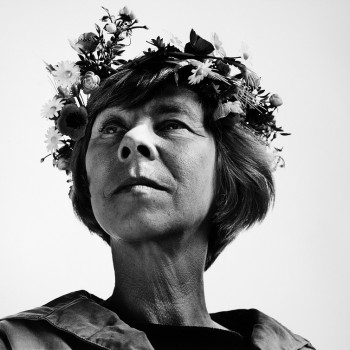Tag: short story
The Monkey
Issue 2/1981 | Archives online, Fiction, Prose
A short story from Dockskåpet (‘The doll’s house’). Introduction and translation by W. Glyn Jones
The newspaper came at five o’clock, as it did every morning. He lit the bedside lamp and put on his slippers. Very slowly he shuffled across the smooth concrete floor, threading his way as usual between the modeling stands; the shadows they cast were black and cave-like. He had polished the floor since last making some plaster casts. There was a wind blowing, and in the light from the street lamp outside the studio the shadows were swaying to and fro, forced away from each other and then brought together again: it was like walking through a moonlit forest in a gale. He liked it. The monkey had wakened up in its cage and was hanging on to the bars, squealing plaintively. “Monk-monk,” said the sculptor as he went out into the hall to fetch his newspaper. On his way back he opened the door of the cage, and the monkey scrambled on to his shoulder and held on tight. She was cold. He put her collar on and fastened the lead to his wrist. She was a quite ordinary guenon from Tangier that someone had bought cheap and sold at a large profit: she got pneumonia now and then and had to be given penicillin. The local children made jerseys for her. He went back to bed and opened his newspaper. The monkey lay still, warming herself with her arms around his neck. Before long she sat down in front of him with her beautiful hands clasped across her stomach; she fixed her eyes on his. Her narrow, grey face betrayed a patience that was sad and unchanging. “Go on – stare, you confouded orangoutang,” the sculptor said and went on reading. When he reached the second or third page the monkey would suddenly and with lightning precision jump through the newspaper, but always through the pages he was finished with. It was a ritual act. The newspaper is torn apart, the monkey shrieks in a triumph and lies down to sleep. It can give you some relief to read about all the worthless nonsense that goes on in the world every morning at five o’clock and then to have it confirmed that it is worthless nonsense when the whole lot is made unreadable by a great hole being made through it. She helped him to get rid of it. More…
Hilda Husso
Issue 1/1980 | Archives online, Fiction, Prose
A short story from Kun on tunteet (‘When you have feelings’,1913). Introduction by Irmeli Niemi
A Phone call between Hotels
‘Hello – is that the Francesca?’
‘— — —’
‘I’d like to speak to Mr Aksel Lundqvist, the maître d’hotel, if it’s possible, please.’
‘— — —’
‘Oh, I see, that is Mr Lundqvist. I’m ringing from the Iris Hotel. It’s Hilda Husso here – do you remember me, Mr Lundqvist?’
‘— — —’
‘I used to be at Ekbom’s, as a cleaner, in the Brasserie, and I got pregnant – it was a boy, you may remember?’
‘— — —’
‘Hello, what was that, I can’t hear?’ More…
The Conference
Issue 4/1978 | Archives online, Fiction, Prose
A short story from Alamaisen kyyneleet (‘Tears of an underdog’, Karisto 1970). Introduction by Pekka Tarkka
Dr Smith said that he did not believe that any immediate threat of an invasion from Space was likely to arise for some time. Observations to date had given no support to the view that any such preparations had been put in hand. Technically they were of course ahead of us, but in his opinion there was no cause for panic. Nor could he endorse the widespread but naive assumption that any confrontation with beings from Space must inevitably lead to war. If human beings had reason to feel threatened, it was from each other that the chief threat came. He urged the Conference to work for a situation in which every country would be preparing for peace rather than for war. He said he had no wish to sound sardonic, but that he had noticed that when war was prepared for, it was usually war that ensued. More…
The Onlookers
Issue 3/1978 | Archives online, Fiction, Prose
A short story from Naisten vuonna (‘In women’s year’, 1975). Introduction by Pekka Tarkka
The two elks came out on to the road through a gap between timber sheds. They began to cross the road, and the larger one was very nearly run into by a car. Cars stopped and horns tooted, till the elks turned and made off towards the harbour. Several cars swung round and drove along the cinder track in pursuit of the animals.
The elks headed across the rubble towards the power station; after circling some stacks of railway sleepers, they ended up on the flank of a coalheap sixty feet high. The cars pulled up and their occupants poured out, shouting that the elks wouldn’t go that way, it was a dead end. The elder of the two elks had indeed sensed this, and they moved off to the right, skirting the coal-heap and emerging among the timber-stacks. By this time the first cyclists and pedestrians had arrived on the scene.
“They’ll break their legs,” said a pedestrian to a motorist. “There’s all kinds of junk lying about.” More…

